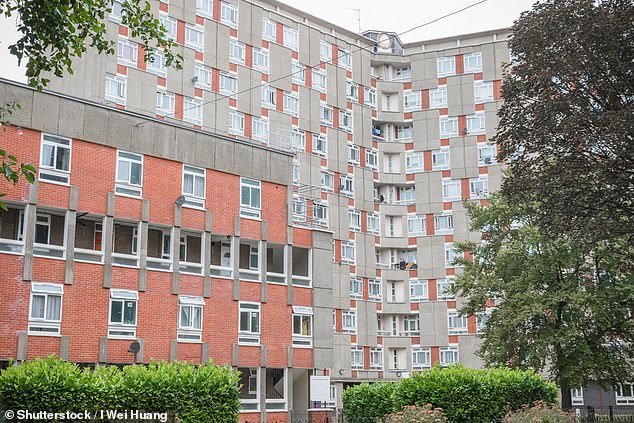The Government’s scientists considered using Covid-19 quarantine hotels for vulnerable people who live in the most deprived areas of Britain, it emerged today.
Overcrowded households with poor ventilation, such as high-rise flats, make it difficult to adhere to social distancing if someone with the virus is asked to self-isolate.
The Government’s Scientific Advisory Group for Emergencies (SAGE) said this was risky in multi-generation households, where old and vulnerable people can’t escape the disease.
Experts asked the Government to consider using designated accommodation to house at-risk people when their family member tests positive for the disease.
In a scientific report handed to Number 10 to help guide ministers through the second wave of the virus in winter, SAGE suggested offering people ‘safe and appropriate accommodation outside the home if it is impossible to sufficiently isolate vulnerable household member.’
The idea has been lifted from South Korea, which has been using the tactic throughout the pandemic for poor and homeless people, as well as care home workers.
This idea hinges on using hotels as isolation zones, where people can stay and be looked after while they recover and complete their isolation period.
It relieves pressure from people who may struggle to look after themselves at home, pay for necessities if they are out of work or be unable to go to food banks or shops, for example.
Meanwhile, in separate SAGE files handed to ministers, experts warned against making face masks compulsory in offices – something which many leading experts have been calling for.
SAGE said the risk of masks becoming contaminated increased the longer a person wore it in a confined space, which would have the opposite of the desired effect. They said this could even lead to acne and eczema.
Overcrowded households with poor ventilation, such as high-rise flats, makes it difficult to adhere to social distancing if someone with the virus is asked to self-isolate
Official data has shown that the most deprived people in Britain are dying at roughly twice the rate of people living in the wealthiest neighbourhoods.
Health inequality between the rich and poor is not unique to Covid. Poorer people are more likely to suffer a slew of diseases than wealthy people, including heart disease, obesity and diabetes.
It is caused by the fact poorer people on the whole drink and smoke more and eat less healthy diets.
The SAGE report, which has not been dated, is thought to have been compiled in the last few months, based on its language about a winter wave of the virus.
Writing in it, SAGE said: ‘Covid-19 mortality rates have been linked to houses of multiple occupation, temporary accommodation, multi-generation households, shortages of social housing and areas where overcrowding is more prevalent.
‘Offers of accommodation outside the home may be welcomed by some households with vulnerable member(s), high exposure and insufficient capacity to self-isolate but will only be taken up if essential needs are met, including ensuring that quarantining does not expose to higher infection risk and providing appropriate caring provision, necessities and facilities.
‘It is essential that families are aware that quarantining outside the home is totally optional as many families will strongly prefer all members remaining in the home.
‘Costs of provision may not be excessive since relatively few households will meet all the criteria for providing provision outside the home and also welcome such provision.
‘However, such provision could potentially reduce health inequalities and be cost-effective if it prevents transmission to individuals from low income households at high risk of severe outcomes from Covid-19.’
There are fears that many people are ignoring the Government’s Covid rules because they do not have the financial security to skip work, while others lived in crowded homes where isolating was impossible.
Asian countries such as South Korea and India have been using hotels as isolation zones for suspected patients since the tourism industry shut down at the start of the crisis.
The rooms were prioritised for people with mild or no symptoms who were required to self-isolate following contact tracing efforts.
Rooms were provided free of charge and provided mostly to people who could not self-isolate at home or because they were homeless or in a care home.
The move had the added benefit of reducing job loss in the tourism and hospitality industries – two of the hardest-hit by the crisis.
Meanwhile, SAGE also advised the Government against making employees wear masks in offices because it believed adherence to the rules would be low.
The British Medical Association (BMA) has for months been calling for coverings to be compulsory in all work settings.
But SAGE said: ‘Contamination of face coverings is likely to increase with duration of wearing and therefore the risk of transmission via touching or surface contamination from more heavily contaminated face coverings could increase with time.
‘There is some evidence that extended duration wearing of face masks and face coverings can result in skin conditions such as acne or dermatitis for some people, but there is no data on the frequency or severity of this concern.
‘Issues of tolerability and minor adverse effects (e.g. thermal discomfort, minor skin irritation, glasses steaming) are likely to be the main limiting factors for duration of wearing of face coverings, and need to be factored into guidance on duration of use and likely adherence with advice.’
